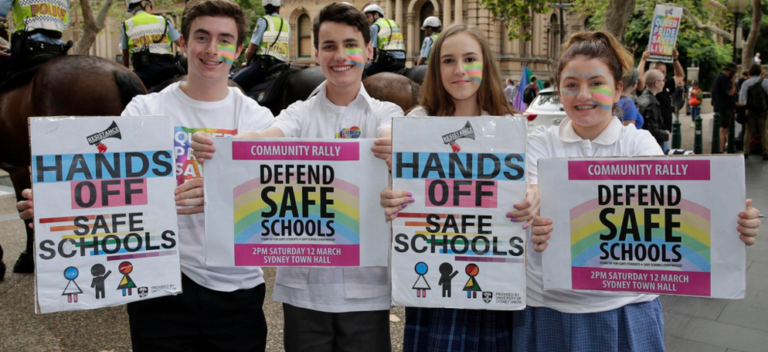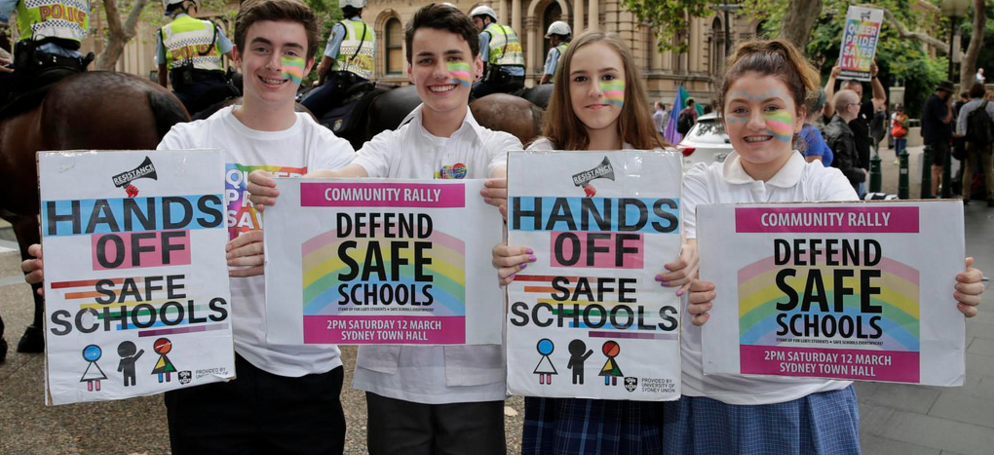
Ninety three per cent of LGBTQI students in Australia have heard homophobic language at school, with 37 per cent of these young people hearing such language daily, a new study has found.
The study, Free2Be… Yet? Was released by Western Sydney University and is the second of its kind. It surveyed around 2,376 LGBTQ students aged between 13 and 18 at government, independent and Catholic high schools across Australia.
Alarmingly close to 30 per cent said they had either witnessed or been the victims of physical harassment targeted at LGBTQI students.
Of those who responded, around 57 per cent of the respondents were enrolled at a public school, with around 90 per cent identifying as either male or female. Less than 10 per cent identified as non-binary. 35 per cent identified as bisexual, and 21 per cent identified as lesbian or gay a sizeable minority of participants identifying as pansexual (18 per cent) and queer (7 per cent).
‘Student Threw A Rotten Apple’
One year 12 student, whose identity has been retracted, recalled an incident where a “[A student] threw a rotten apple at the back of my head after telling me that the common room is for ‘normal straight people only’. The teacher present then told me I had to leave because I was causing trouble by being there.”
While transphobic language was reported with less frequency overall, 71 per cent of students reporting ever hearing such language at school. Teachers were described as far less likely to intervene positively to stop students’ use of this language than they were in instances of homophobic language,
29 per cent of participants indicated that they had witnessed physical harassment of classmates perceived to be gender and sexuality diverse, with 7 per cent of participants witnessing such harassment on a weekly basis. Most alarmingly only 11 per cent of young people who witnessed physical harassment which occurred within view of school staff reported that these adults always intervened.
Teachers Rarely Intervene To Stop Homophobia
Led by Jacqueline Ullman, an associate professor of adolescent development, behaviour and wellbeing at WSU who said in an article written for The Conversation that the study “shows alarming rates of homophobic language used in Australian schools. And worse, it shows that, at least from the perspective of students, teachers rarely intervene.”
“LGBTQ+ students who reported more inclusion of diversity issues in their curriculum had significantly better school-based wellbeing than LGBTQ+ students in schools with little to no inclusion.
“Unsurprisingly, LGBTQ+ students with higher levels of these forms of wellbeing were significantly more likely to say they would attend university,” Ullman went on to add.
The survey continued, asking students to also indicate how true it was that their “teachers talk about same-sex attraction (lesbian, gay or bisexual people or topics) in a positive way”. Response options ranged from “definitely false” to “definitely true”.
“Results show that where students viewed their teachers as more positive about same-sex attraction across each of the six response options, they also reported higher academic self-concept,” Ullman said of the findings.
Moves To Erode Rights of LGBTQI+ Students
In New South Wales, Mark Latham’s Education Legislation Amendment Bill which was introduced to Parliament in early August 2020 aims to amend the Education Act 1990, the Education Standards Authority Act 2013 as well as the Teacher Accreditation Act 2004 and ban any possibility for the recognition of transgender and gender diverse students in schools.
Federally, with the ongoing debate surrounding the Religious Freedoms Bill continues and despite three years having passes since Prime Minister Scott Morrison said his government would enact a law to ban religious schools from expelling LGBTQI+ students, there has yet been no move yet to keep that promise.
Both bills if passed, are set to erode at the rights and liberties of LGBTQI students in educational settings and the newly released study has proven that fight to protect such rights is far from over and if anything needs to step up a notch.
